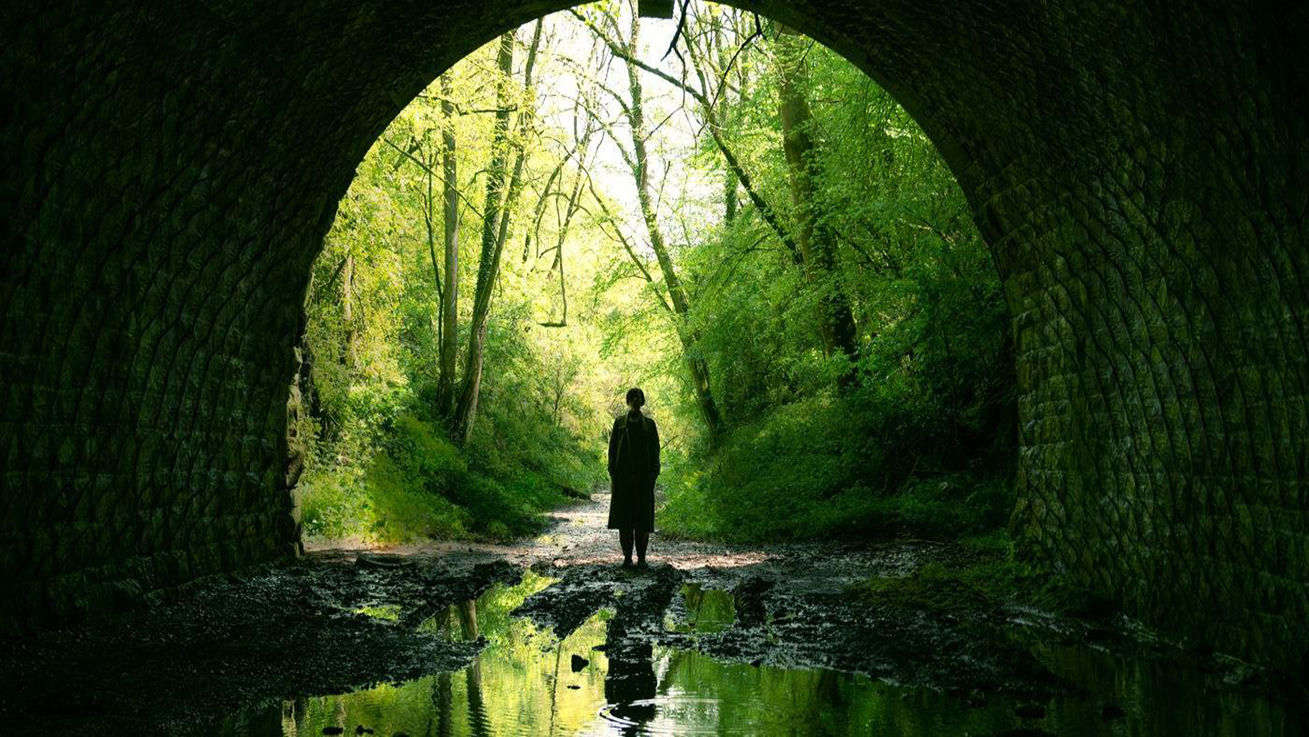 Men (2022, Dir. Alex Garland)
Men (2022, Dir. Alex Garland)Of Hollywood and Men
Another film examines the horrors of being a woman, yet Hollywood is as unaware as ever
By Natalie Duerr
7.6.2022
Following in the footsteps of Edgar Wright’s Last Night in Soho and Emerald Fennel’s Promising Young Woman, Alex Garland’s Men is Hollywood’s latest entry into the “horror of being a woman” genre. With “Men” in red, bold lettering across the eyes of a glaring Rory Kinnear, the poster signaled that the film would deconstruct, or at least comment on, toxic masculinity. Instead, it’s an incongruent and gory scream that favors being flashy over substantive.
From the beginning, Men conceals itself as intelligent. Garland emphasizes moments of patronizing sexism and uncomfortable touches, seemingly saying to women, “I see you.” But beyond these elementary references to women’s experiences, the film offers no substantial feminist narrative. Garland’s story leaves his main heroine Harper (Jessie Buckley) powerless, abjected, and repeatedly terrorized by an unstoppable monster in the form of misogyny.
Of course, all horror films require a bit of internal yelling, but Men surpassed what I was willing to look past. A woman traveling to a middle-of-nowhere cottage by herself? Hiking alone in an unfamiliar area without letting anyone know or bringing some protective gear? Staying in the cottage after a man stalked her AND tried to break in? For better or worse, these don’t seem like the decisions any woman in my life would make. Of course, Harper is not to blame for these men’s actions against her. However, it seems like Garland is blissfully unaware of how often women adapt their behavior to avoid harassment (or worse). But hey, for the sake of the plot, you should definitely stay in the creepy cottage after you find out the police released the naked man that stalked you from prison!
Even so, the audience knows so little about Harper that she merely becomes a vessel for a heavily prosthetic and CGI-ed Kinnear to terrorize. What kind of work does she do? Something with spreadsheets. Does she have any hobbies? Unknown. A friend? At least one. All the audience can glean about Harper is that she is a woman recovering from trauma who, at least for the duration of the film, can only react to the behavior of men around her (though Buckley does this brilliantly).
And by the time Garland is done with his masochistic depiction of men, audiences are subjected to an unexpected body horror birthing scene (perhaps more Cronenberg-esque than Cronenberg’s recent Crimes of the Future) that feels narratively repetitive and over the top. According to Kinnear, this sequence took a week to film, and I can’t help but think that Garland could have invested that time into his script instead.
The infamous rebirthing scene, paired with an earlier (and obvious) reference to Adam and Eve, flips the concept of “original sin”—the idea that women are to blame for men’s downfall—to the notion that men are inherently misogynistic, passing that trait down through the generations. While it may take different forms, men are all battling the inner demon of misogyny. Instead of destroying the very binary and heteronormative concept of “original sin,” Garland deconstructs and reassembles a version that doesn’t feel any better. Garland says, “Yes, all men,” but then what path forward do we have if sexism is ingrained in half of the human race?
In the end, Harper is deprived of the chance to process her initial trauma and thrusted into a situation that grows and distorts it. Instead of making a provocative claim on power dynamics in gendered relationships, Garland only shows a woman who is powerless in the face of men’s terror. At least now for Harper, everyday misogyny will be nothing compared to this, I guess?
And it’s not even that the issue is solely how men conceive misogyny—even Emerald Fennel’s Promising Young Woman failed to be a feminist innovation. Her main character is one-dimensional, too, and (spoiler alert) eventually falls victim to patriarchal violence, relying on the police (who failed to protect women the entire film) to serve justice.
Perhaps I approached this film with a tarnished mind full of preconceived notions and personal experiences. But after the blunders of Promising Young Woman and Last Night in Soho to make any progressive statement on feminism, I’m sick of Hollywood’s thinly veiled metaphors for misogyny. I leave these films wondering what material steps the creators and the overall industry have taken to become more equitable. Men made me realize that gems like Michaela Coel’s I May Destroy You, which give their heroines agency in a system that continuously fails them, are few and far between.
